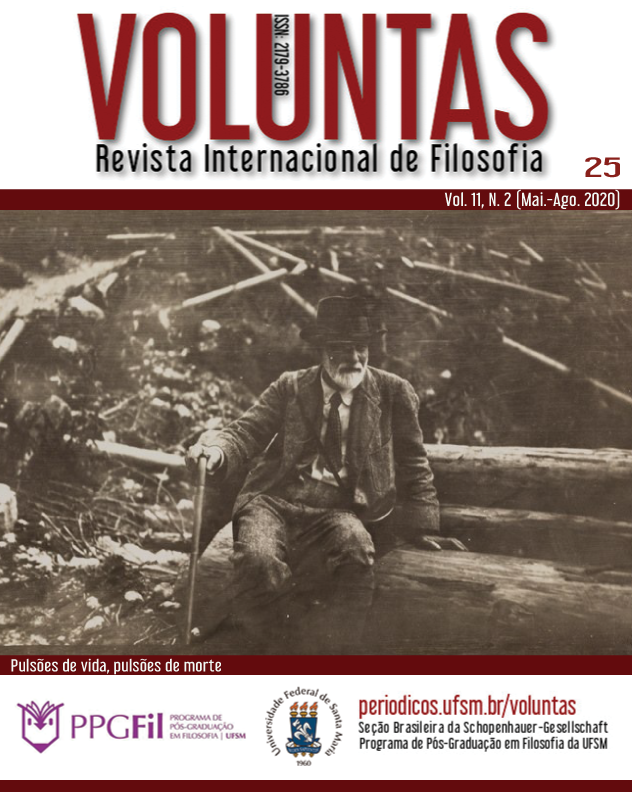Wilhelm Reich’s critique of Freudian death drive
DOI:
https://doi.org/10.5902/2179378647055Keywords:
Reich, Freud, Death Drive, Clinic, PoliticsAbstract
This paper aims to propose a reading of W. Reich’s critique of Freudian notion of death drive. To do this we will present firstly three presuppositions of his critique: the most general project of his work, his concept of science and his lecture of Freud’s work. After that we will outline the main features of Reich’s critique of death drive as such. Thirdly we will present the drive theory proposed by Reich as an alternative to Freud’s second drive theory. Finally we will show a peculiar aspect of what we could call “psychologist dimension” of Reich’s critique of Freudian theory of death drive.Downloads
References
DELEUZE, G. Nietzsche et la philosophie. Paris: PUF, 1983.
FERENCZI, S. Journal clinique. Paris: Payot, 1985.
FREUD, S. Analyse der Phobie eines fünfjährigen Knaben. In: Gesammelte Werke 7. Frankfurt: Fischer, 1990.
FREUD, S. Das ökonomische Problem des Masochismus. In: Gesammelte Werke 13. Frankfurt: Fischer, 1990.
FREUD, S. Das Unbehagen in der Kultur. In: Gesammelte Werke 14. Frankfurt: Fischer, 1990.
FREUD, S. Der Mann Moses und die monotheistische Religion. In: Gesammelte Werke 16. Frankfurt: Fischer, 1990.
FREUD, S. Die endliche und die unendliche Analyse. In: Gesammelte Werke 16. Frankfurt: Fischer, 1990.
FREUD, S. Die Traumdeutung. In: Gesammelte Werke 2-3. Frankfurt: Fischer, 1990.
FREUD, S. Formulierungen über die zwei Prinzipien des psychischen Geschehens. In: Gesammelte Werke 8. Frankfurt: Fischer, 1990.
FREUD, S. Jenseits des Lustprinzips. In: Gesammelte Werke 13. Frankfurt: Fischer, 1990.
NIETZSCHE, F. Jenseits von Gut und Böse. In: Kritische Gesamtausgabe VI/2. Berlim: de Gruyter, 1968.
NIETZSCHE, F. Zur Genealogie der Moral. In: Kritische Gesamtausgabe VI/2. Berlim: de Gruyter, 1968.
REICH, W. Charakteranalyse. Viena: Manzsche, 1933.
REICH, W. Der dialektische Materialismus in der Lebensforschung. Copenhague/Oslo: Sexpol, 1937.
REICH, W. Der Einbruch der Sexualmoral. Copenhague: Sexpol, 1935.
REICH, W. Der masochistische Charakter. Eine sexualökonomische Widerlegung des Todestriebes und des Wiederholungszwanges. In: Internationale Zeitschrift für Psychoanalyse. Band 18, Heft 3, pp. 303-351. Viena: Internationaler Psychoanalytischer Verlag, 1932.
REICH, W. Der Urgegensatz des vegetativen Lebens. In: Zeitschrift für politische Psychologie und Sexualökonomie, Band 1, Heft 2. Copenhague: Trobis, 1934.
REICH, W. Dialektischer Materialismus und Psychoanalyse. Copenhague: Sexpol, 1934.
REICH, W. Die Bione. Oslo/Copenhague/Zurique: Sexpol, 1938
REICH, W. Die Funktion des Orgasmus. Leipzig/Viena/Zurique: Internationaler Psychoanalytischer Verlag, 1927.
REICH, W. Die Sexualität im Kulturkampf. Copenhague: Sexpol, 1936.
REICH, W. Massenpsychologie des Faschismus. Copenhague/Praga/Zurique: Sexpol, 1933.
REICH, W. Reich speaks on Freud. Nova York: Farrar, Straus & Giroux, 1972.
REICH, W. The Cancer Biopathy. Nova York: Farrar, Straus & Giroux, 1973.
REICH, W. The Discovery of the Orgone I. Nova York: Farrar, Straus & Giroux, 1973.
REICH, W. Zeitschrift für politische Psychologie und Sexualökonomie. Band 1. Heft 1. Copenhague: Sexpol, 1934.
WINNICOTT, D.D. Playing and Reality. Londres/Nova York: Routledge, 2005.
Published
How to Cite
Issue
Section
License
Copyright (c) 2020 Voluntas: International Journal of Philosophy

This work is licensed under a Creative Commons Attribution-NonCommercial-ShareAlike 4.0 International License.
The submission of original manuscripts to this journal implies the transference, by the authors, of the copyrights for printed and digital publication. The copyrights of a published manuscript belong ultimately to the author, and only the copyright for its first publication is reserved to the journal. Authors may only use the same results in other publications explicitly indicating this journal as the medium of the original publication.
Licence
Attribution-NonCommercial-ShareAlike 4.0 International (CC BY-NC-SA 4.0) - This license lets others remix, tweak, and build upon your work non-commercially, as long as they credit you and license their new creations under the identical terms.






